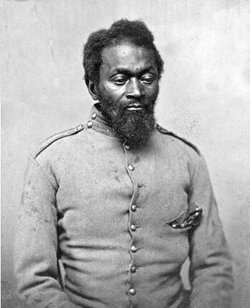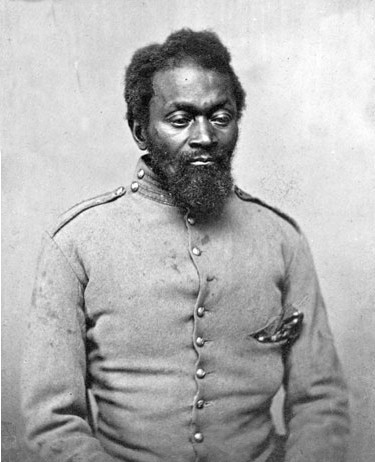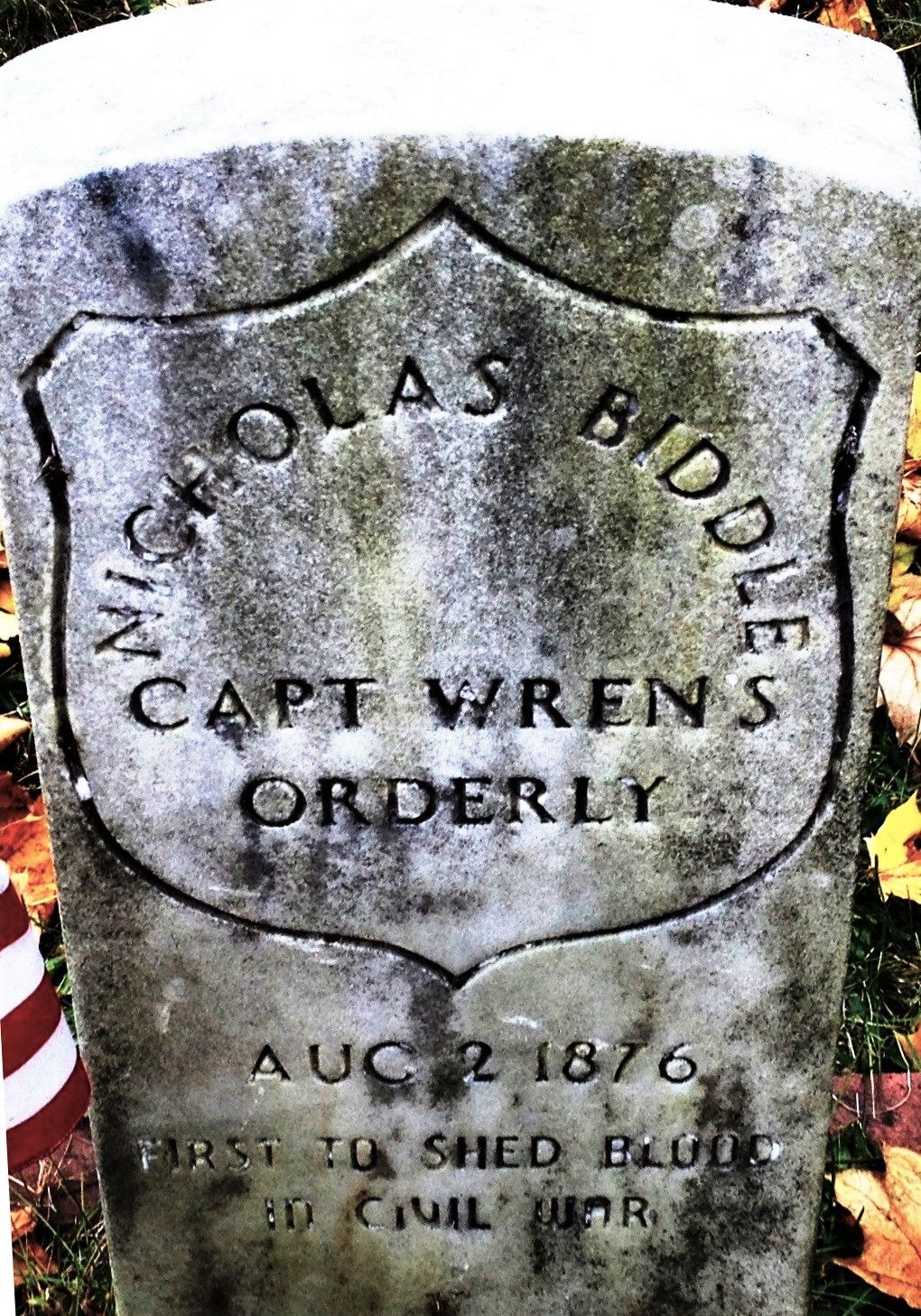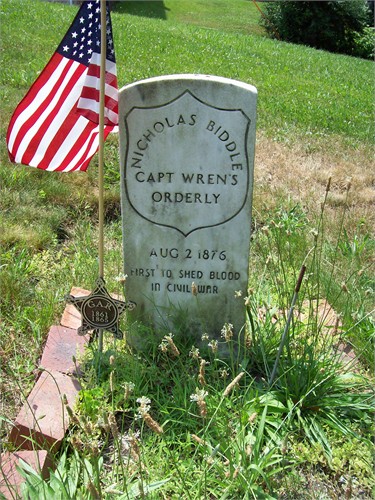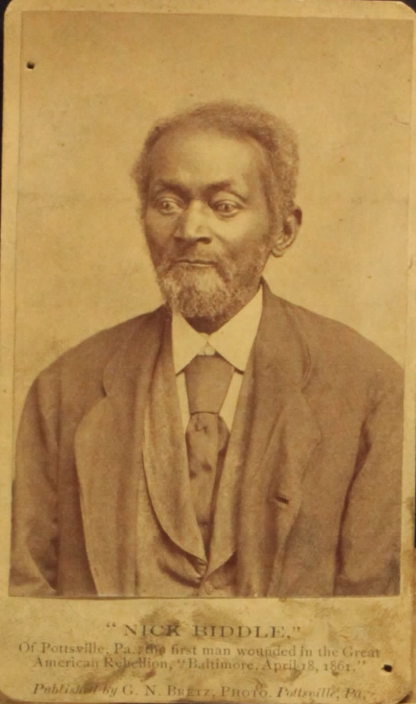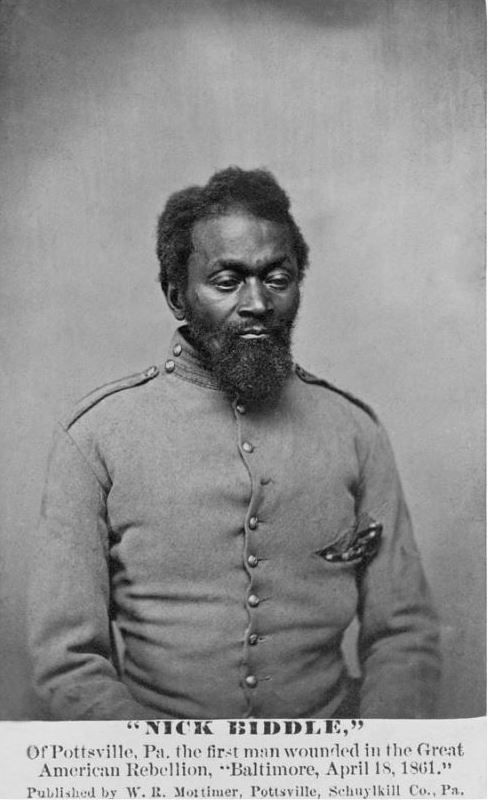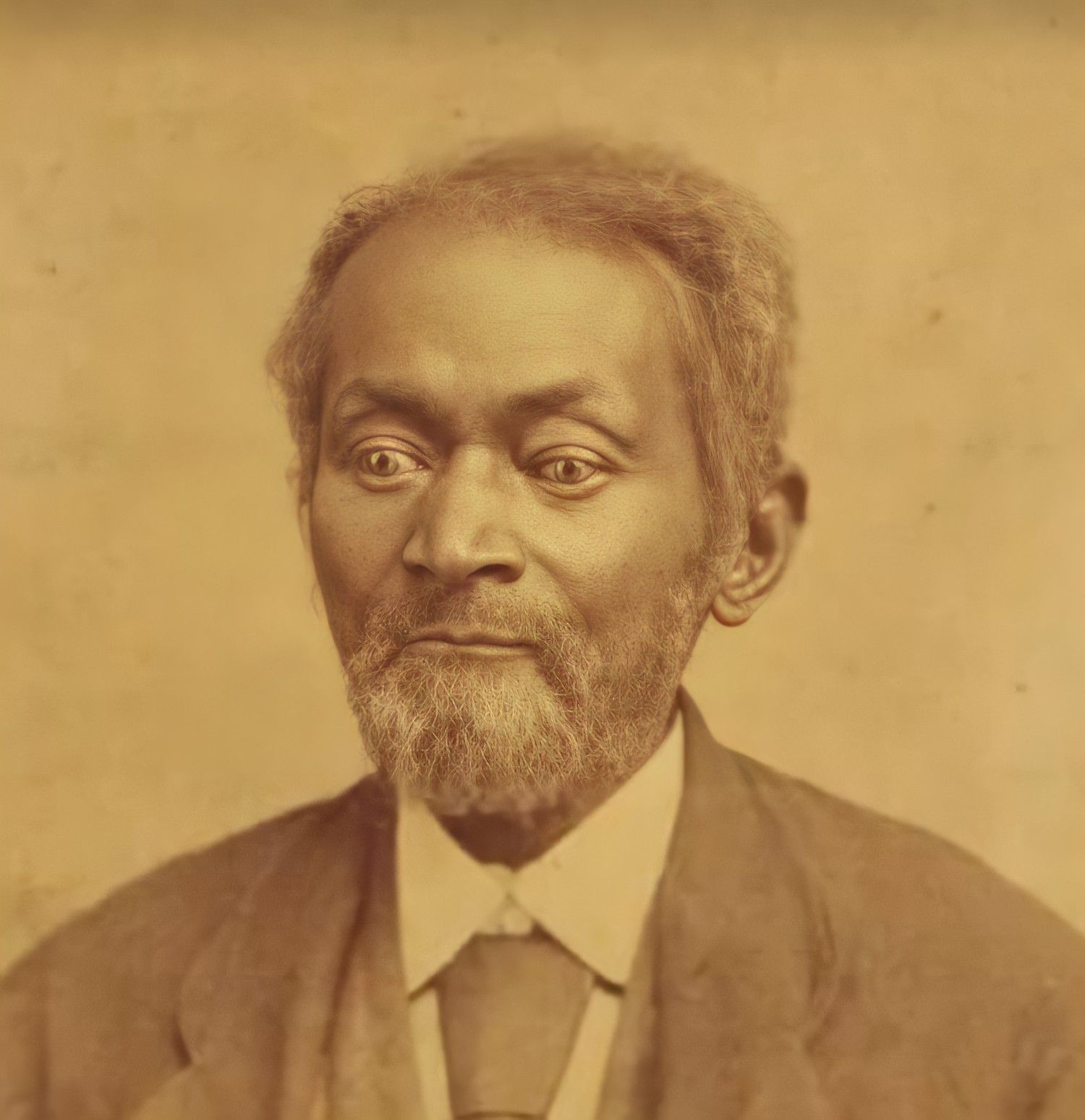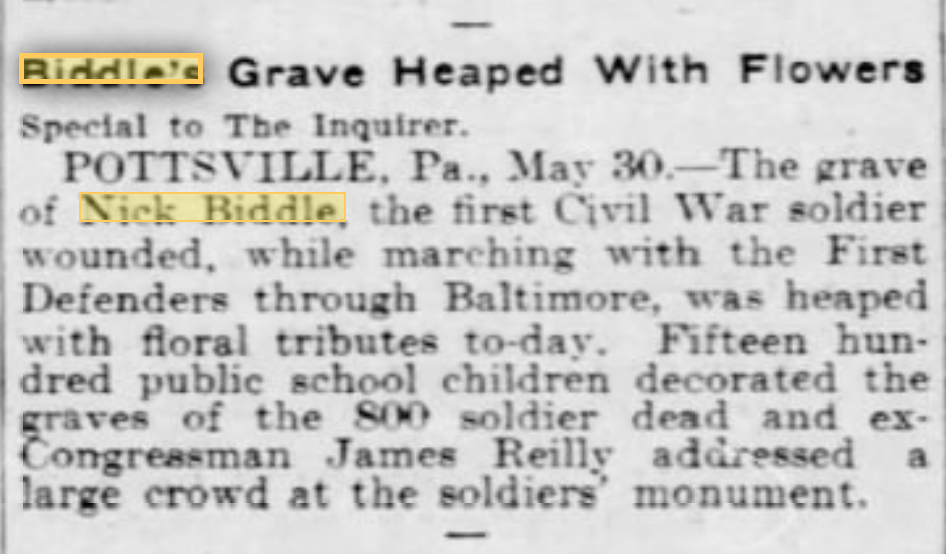By 1840, he was living in Pottsville and working various jobs to earn a living. He worked as a street vendor, selling oysters in the winter and ice cream in the summer, and in 1860, he was a porter. Biddle became friends with many of the men in the local militia. Originally named the "Pottsville Blues," their name was later changed to the Washington Artillerists when they changed branches. The men in the unit gave him a uniform to wear and he attended their drills and excursions for the next 20 years. All this time, the Washington Artillerists had maintained a state of readiness and responded immediately to President Lincoln's call to arms when the Civil War broke out. They were one of the first companies to respond. By this time, Nicholas was 65 years of age. He served as an aide to Captain James Wren. Because he was African American, he was not permitted to join the US Army, but he wore the uniform the regular soldiers had given to him.
On April 18, 1861, the soldiers were given emergency orders to go to Washington D. C., which was expected to be attacked by Confederates. On their way there, they had to get off the train at Baltimore, Maryland - a pro-slavery state. Before they could get on their next trains, they were attacked by a mob of pro-slavery sympathizers who threw bricks and stones at them. The crowd swelled to nearly 2,000 people. As Biddle, a black man in uniform, tried to make his way through Baltimore, he was spotted and some of the attackers became enraged. Shouts of "Nigger in uniform!" were heard. Capt. Wren later wrote about the riot, "Poor Nick had to take it."
Biddle was knocked to the ground when he was hit with a brick in the head, causing the bone of his skull to be exposed. He recovered but was deeply and visibly scarred for the rest of his life. After the war, he often said, "I would go through the infernal regions with artillery, but would never again go through Baltimore!"
President Lincoln heard about the arrival of the soldiers in Washington D. C., and the circumstances of their journey through Baltimore. The morning after the soldiers arrived, he personally thanked each member of the five companies of men, and shook their hands. Then he noticed Biddle, an elderly black man dressed in the uniform of the Washington Artillerists, and his head wrapped in blood-soaked bandages. As Biddle's blood dripped on the floor of the capitol, President Lincoln took him by the hand and tried to get him to seek medical treatment. But Biddle refused. He wanted to stay with the men in his company.
After his military service, he returned to Pottsville. He went to the Great Central Fair in Philadelphia in 1864 to raise funds for wounded Union soldiers by selling photographs of himself in his uniform, with the caption "First man wounded in the Great American Rebellion." For a time, he did odd jobs for local citizens. In the late 1860's and early 1870's, he was often seen walking around Pottsville, carrying a piece of paper.
The Miner's Journal reported: "If poor old Nick Biddle calls on you with a document, as he calls it, don't say you are in a hurry and turn him off, but ornament the paper with your signature and plant a good round sum opposite your name. Nick has been a good soldier and now that he is getting old and feeble, he deserves the support of our citizens."
Biddle always insisted that he had large amounts of money saved in the bank. But when he died in 1876, he was destitute. The men of the Washington Artillerists and the National Light Infantry donated their own money to get a headstone for his grave. They also arranged his funeral. Led by the Pottsville Drum Corps and followed by two of the First Defender units, the lengthy procession made its way through town, from Biddle's home to his final resting place.
The original headstone for his grave was inscribed:
"In Memory of Nicholas Biddle, Died Aug.2, 1876, Aged 80 years. His was the Proud Distinction of Shedding the First Blood in the Late War for the Union, Being Wounded while marching through Baltimore with the First Volunteers from Schuylkill County, 18 April 1861. Erected by his Friends in Pottsville."
Over the years, the original headstone was destroyed by vandals. A new marker has taken its place. It is inscribed "First to Shed Blood in Civil War." Nicholas Biddle, Civil War hero, is not forgotten.∼Co. I, 10th Regt. NJV, by Post 23, GAR
By 1840, he was living in Pottsville and working various jobs to earn a living. He worked as a street vendor, selling oysters in the winter and ice cream in the summer, and in 1860, he was a porter. Biddle became friends with many of the men in the local militia. Originally named the "Pottsville Blues," their name was later changed to the Washington Artillerists when they changed branches. The men in the unit gave him a uniform to wear and he attended their drills and excursions for the next 20 years. All this time, the Washington Artillerists had maintained a state of readiness and responded immediately to President Lincoln's call to arms when the Civil War broke out. They were one of the first companies to respond. By this time, Nicholas was 65 years of age. He served as an aide to Captain James Wren. Because he was African American, he was not permitted to join the US Army, but he wore the uniform the regular soldiers had given to him.
On April 18, 1861, the soldiers were given emergency orders to go to Washington D. C., which was expected to be attacked by Confederates. On their way there, they had to get off the train at Baltimore, Maryland - a pro-slavery state. Before they could get on their next trains, they were attacked by a mob of pro-slavery sympathizers who threw bricks and stones at them. The crowd swelled to nearly 2,000 people. As Biddle, a black man in uniform, tried to make his way through Baltimore, he was spotted and some of the attackers became enraged. Shouts of "Nigger in uniform!" were heard. Capt. Wren later wrote about the riot, "Poor Nick had to take it."
Biddle was knocked to the ground when he was hit with a brick in the head, causing the bone of his skull to be exposed. He recovered but was deeply and visibly scarred for the rest of his life. After the war, he often said, "I would go through the infernal regions with artillery, but would never again go through Baltimore!"
President Lincoln heard about the arrival of the soldiers in Washington D. C., and the circumstances of their journey through Baltimore. The morning after the soldiers arrived, he personally thanked each member of the five companies of men, and shook their hands. Then he noticed Biddle, an elderly black man dressed in the uniform of the Washington Artillerists, and his head wrapped in blood-soaked bandages. As Biddle's blood dripped on the floor of the capitol, President Lincoln took him by the hand and tried to get him to seek medical treatment. But Biddle refused. He wanted to stay with the men in his company.
After his military service, he returned to Pottsville. He went to the Great Central Fair in Philadelphia in 1864 to raise funds for wounded Union soldiers by selling photographs of himself in his uniform, with the caption "First man wounded in the Great American Rebellion." For a time, he did odd jobs for local citizens. In the late 1860's and early 1870's, he was often seen walking around Pottsville, carrying a piece of paper.
The Miner's Journal reported: "If poor old Nick Biddle calls on you with a document, as he calls it, don't say you are in a hurry and turn him off, but ornament the paper with your signature and plant a good round sum opposite your name. Nick has been a good soldier and now that he is getting old and feeble, he deserves the support of our citizens."
Biddle always insisted that he had large amounts of money saved in the bank. But when he died in 1876, he was destitute. The men of the Washington Artillerists and the National Light Infantry donated their own money to get a headstone for his grave. They also arranged his funeral. Led by the Pottsville Drum Corps and followed by two of the First Defender units, the lengthy procession made its way through town, from Biddle's home to his final resting place.
The original headstone for his grave was inscribed:
"In Memory of Nicholas Biddle, Died Aug.2, 1876, Aged 80 years. His was the Proud Distinction of Shedding the First Blood in the Late War for the Union, Being Wounded while marching through Baltimore with the First Volunteers from Schuylkill County, 18 April 1861. Erected by his Friends in Pottsville."
Over the years, the original headstone was destroyed by vandals. A new marker has taken its place. It is inscribed "First to Shed Blood in Civil War." Nicholas Biddle, Civil War hero, is not forgotten.∼Co. I, 10th Regt. NJV, by Post 23, GAR
